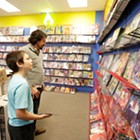Book Review
[
{
"name": "Broadstreet - Instory",
"component": "25846487",
"insertPoint": "4",
"requiredCountToDisplay": "4"
},{
"name": "Broadstreet - Empower Local",
"component": "27852456",
"insertPoint": "8",
"requiredCountToDisplay": "8"
},{
"name": "Broadstreet - Instory",
"component": "25846487",
"insertPoint": "12",
"requiredCountToDisplay": "12"
},{
"name": "Broadstreet - Instory - 728x90 / 970x250",
"component": "27852677",
"insertPoint": "18",
"requiredCountToDisplay": "18"
},{
"name": "Broadstreet - Instory",
"component": "25846487",
"insertPoint": "5th",
"startingPoint": "23",
"requiredCountToDisplay": "24",
"maxInsertions": 100
}
]
by MARTY DEMAREST & r & & r & Spook Country & r & by William Gibson & r & & r & & lt;span class= "dropcap " & I & lt;/span & want to pry the comma key off William Gibson's keyboard. Maybe the quintessential author of techno-paranoia (Neuromancer, Pattern Recognition) uses an old-fashioned typewriter. Regardless, the comma's gotta go. Gibson usually uses it several times in each short sentence of his scrubbed-down prose, making it sound as though he were giving dictation in short bursts of breath. I also wouldn't mind removing his SHIFT key. From the first pages of Spook Country to the final, most nouns and even some verbs are brand names. PowerBook. iPod. Ativan. Bluetoothed. Perhaps he thinks this gives the novel a cutting, contemporary edge, but most of my friends simply say "laptop," "music," "drugs" or "connected." I suspect Spook Country won't last past a generation that knows River Phoenix was a person.
In Spook Country, Gibson tries to feel out the connections between terrorist organizations, government spies and civilians with a novel in three parts: A charismatic young man who helps pass illegal information and goods around New York, a bumbling cell-phone-tapping government contractor, and a former pop star. Gibson flips between these characters as they inch towards each other, giving the book its only pace: forced and glacial. He stops his story every few pages and switches the scene, giving play to everything and highlighting nothing.
Twice, as characters converge in the same physical space, the novel becomes tense and compelling. But the main climax draws in a deus ex machina to sort things out and blithely take over the plot, eliminating all sense of tension.
But plotting and character are not necessarily why I read Gibson. I read him to see what he has to say about the changing face of technology. He makes some interesting comparisons between spiritualism, mythology and wireless communications but leaves these undeveloped as the plot shifts focus. Perhaps most fascinatingly in the era of digitization, Gibson says "music is the most atemporal of all media." He's right. Good music, even ancient drumming and chanting, feels as personally relevant and stimulating today as I imagine it did centuries ago. Writing dates, however, especially writing that tries to keep up with the times rather than the muses.
In Spook Country, Gibson tries to feel out the connections between terrorist organizations, government spies and civilians with a novel in three parts: A charismatic young man who helps pass illegal information and goods around New York, a bumbling cell-phone-tapping government contractor, and a former pop star. Gibson flips between these characters as they inch towards each other, giving the book its only pace: forced and glacial. He stops his story every few pages and switches the scene, giving play to everything and highlighting nothing.
Twice, as characters converge in the same physical space, the novel becomes tense and compelling. But the main climax draws in a deus ex machina to sort things out and blithely take over the plot, eliminating all sense of tension.
But plotting and character are not necessarily why I read Gibson. I read him to see what he has to say about the changing face of technology. He makes some interesting comparisons between spiritualism, mythology and wireless communications but leaves these undeveloped as the plot shifts focus. Perhaps most fascinatingly in the era of digitization, Gibson says "music is the most atemporal of all media." He's right. Good music, even ancient drumming and chanting, feels as personally relevant and stimulating today as I imagine it did centuries ago. Writing dates, however, especially writing that tries to keep up with the times rather than the muses.
















